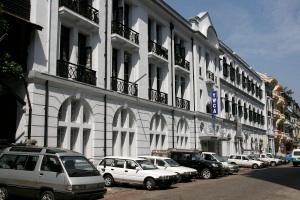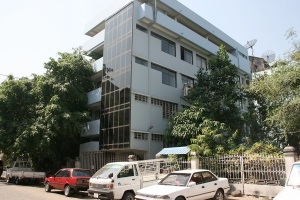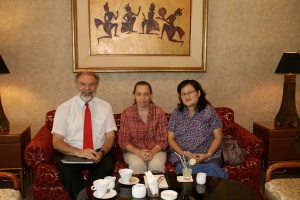Is there a Brain Drain issue?
Sunday, 20 February 2011
As one of the two UWC Heads on the National Committees Development Committee (NCDC), I find that I have to spend more time away from the College than I would often wish. However, as the primary group within the UWC movement that is dedicated to enhancing the work of the National Committees, I find the work extremely stimulating and worthwhile, even though it does tug at my innate loyalty to be on the campus with my students.
I mentioned in my blog (‘Creating Opportunities’) on 2nd May 2010 that Li Po Chun United World College has been helping to establish a new National Committee in Myanmar (formerly Burma). Following on from my NCDC commitment in Addis Ababa last week, I spent the latter part of this week working to advance the establishment of the new Committee in Myanmar.
I had an extremely stimulating and informative reflection meeting with Shona and Zin May. This meeting was a necessary prerequisite to my formal recommendation to the UWC International Office in London that the Committee become a fully accredited UWC National Committee from next year. They have done a brilliant job for their first UWC selection process, and they certainly deserve to be granted the status of a full National Committee in my opinion. This will enable Shona and Zin May, together with several others who have been supporting the publicity and selection process, to be able to work autonomously to select students for many other United World Colleges in addition to LPCUWC next year, and to link into the wider network of UWC Committees, both in person and through correspondence. Naturally, LPCUWC will maintain its support for the Myanmar Committee for as long as they need, which I suspect will be until some UWC alumni return to Myanmar to assist the Committee.
United World Colleges are unique in that their students are chosen by selection committees in the students’ home countries through a rigorous merit-based selection process, and then sent overseas (usually with scholarship support) to attend a UWC for the final two years of their secondary schooling.
The members of some National Committees feel that if a student remains overseas and does not return to his or her home country, then it reflects an insufficient level of social commitment on the part of the student they have selected. Some National Committees are even starting to worry that they are sending their nation’s young (potential) leaders to a UWC on the basis that if the students do not subsequently return to their home countries, they will have contributed towards draining their countries of one of their most important resources – highly able human capital.
Of course, the flight of human capital from LEDCs (Less Economically Developed Countries) is not a new phenomenon. Many National Committees rightly take pride that so many of their students get scholarships to prestigious overseas universities in the US and the UK upon graduating from a UWC, and many alumni stay longer in those countries when employment opportunities arise. Thus, some National Committees (especially in the poorest countries) are finding that their alumni often do not return to their home countries, of if they do, only after many years.
It is easy to find reasons why a ‘brain drain’ might occur in an LEDC – better educational opportunities overseas, finding a way to address poverty, escaping from conflict zones, avoiding difficult personal circumstances, supporting their family with foreign money, and even personal interest and a sense of adventure.
The perceived ‘brain drain’ is said to have reached the point where members of some UWC National Committees are beginning to question whether UWCs are still a positive influence on their country’s national development, and even whether the reverse may now be case. As one less-than-thrilled school counsellor from Niger commented when he heard about the departure of one of his best students to a UWC, “The bright ones leave and never come back”.
There is, of course, an uncomfortable, unspoken assumption whenever this matter is discussed - that the world is divided into two parts: the LEDCs, whose UWC alumni are said to have the obligation to return to their home countries, and the rest of the world, whose UWC alumni are apparently free to go wherever they wish without worrying about their home country’s national development.
As we know from experience, in the end, most students will decide to do what is best – for them. As one participant in Addis Ababa asserted, this simply reflects the nature of the teenage brain, which is (hold on to your stereotypes!) developmentally narcissistic, self-centred, anti-authoritarian, while also craving for independence, separation, self-interest and immediacy. For these reasons, so the argument went in Addis Ababa, our students are not at the appropriate developmental stage to address this problem and make a commitment, one way or the other, either to return or not to return to their home country after graduation. Thge members of several National Committees argued that for this reason, the issue needs to be decided for them at a higher level. (I’m not necessarily persuaded by this argument, but I did find it both fascinating and compelling).
But is the so-called ‘brain drain’ really a UWC-related problem? In order to evaluate this issue fully, we need sound data to ascertain the extent of the issue. Some preliminary research conducted last year in one UWC showed that 85% of UWC graduates actually do return to their home countries. If this is so, are the remaining 15% really a problem? This an important question to address, especially when we realise that it is often more effective to help one’s home country when one is physically located outside it. Moreover, UWC’s overall numbers are fairly low on a global scale, so any brain drain is unlikely to be significant nationally.
And then there are three recent and perhaps relevant changes for which we do not yet know the impact. First, the UWC has a new mission statement (approved in 2006) that varies from its predecessor by omitting any reference to social justice. Might that make UWC students less aware of their obligations to give back to their home country?
Second, an extensive and generous system of university scholarships, known as Davis scholarships, was introduced a few years to assist UWC alumni exclusively enter US universities. Many UWC graduates who would previously have had to return to their home countries to attend university now find they can obtain good scholarships to attend top US universities instead. The long-term impact of these scholarships on where UWC alumni will choose to live long-term is unknown.
And third, the widespread growth of social networking and skyping brings UWC students and alumni into more immediate and frequent contact with friends and families in their home countries, even when they are on the other side of the world. Our students have never been so closely connected to their home countries while they are in the Colleges, and many students already seem to know each other quite well (through Facebook) before they even arrive in the College – quite different to just a few years ago. The long-term impact of this change on whether students are more or less likely to return to their home countries after studying in a UWC is also unknown.
Not knowing the impact of these three factors, and no doubt other factors as well, should lead us at least to ask whether the alleged brain drain issue is still significant or not, and more importantly, whether it is likely be significant in a decade from now.
Notwithstanding all this, the brain drain issue IS significant at the grassroots level for many National Committees. From that perspective if no other, it is an important issue that deserves thorough investigation, data collection, and the development of evidence-based action plans wherever appropriate.
I was very impressed that Shona and Zin May were already very conscious of this issue, and they had specifically taken it into account during the selection process. They are keenly aware that a major reason for selecting students to attend United World Colleges is to equip them with skills they can use to advance the future development of Myanmar, and they both feel that this is best done by returning to Myanmar after graduating from university.
For my part, knowing the extremely positive life-changing impact that attending a United World College has on almost every student who is selected, I am absolutely certain that the two pioneer students from Myanmar who will commence studies at Li Po Chun United World College this September will play a significant role in building a better world, and building a better Myanmar – wherever they are located.
The 98-metre high Shwedagon Pagoda in Yangon has achieved iconic status as a symbol of Myanmar.
Boats on the banks of the Yangon River in Yangon. Boats can transport us away to new adventures, but they can always bring us home again too.











